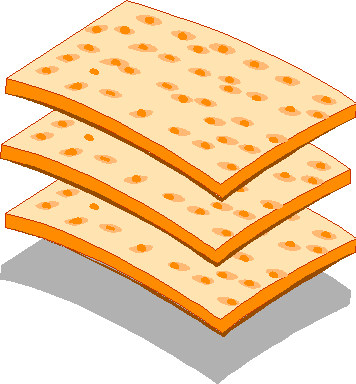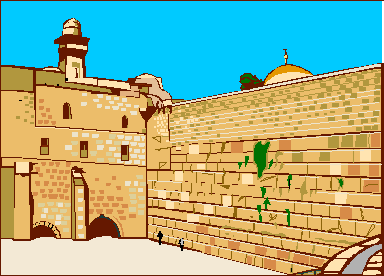
The Chocolate Passover Seder

Hillel Foundation of Greater Houston
Order of the Chocolate Seder
1. Kadesh -- Blessing over the chocolate milk
2. Urchatz -- Washing the hands
3. Karpas -- Eating the green M&M’s
4. Yachatz -- Breaking the middle chocolate Matzah
5. Maggid -- Story of Passover
6. Rachtza -- Washing the hands and saying the blessing
7. Motzi -- Matzah Eating chocolate Matzah
8. Maror -- Eating the bitter chocolate
9. Korech Making the Hillel s’mores
10. Shulchan Orech -- Eating the festival meal
11. Tzafun -- Finding and eating the Afikomen
12. Barech -- Grace after the meal
13. Hallel -- Sing down
14. Nirtzah -- Conclusion
Kadesh – Blessing over chocolate milk
Blessed are You, Eternal our G-d, Sovereign of the universe, Creator of cocoa beans of the tree.
On the Fourth day you created the trees; thereafter, people, under your guidance, devised ways to make all kinds of chocolate.
Blessed are You, Eternal our G-d, Sovereign of the universe, who chose us from all peoples by giving us this confection. With love you gave us this festival for enjoyment, this Feast of Chocolate. You have chosen us to remember chocolate.
Drink your first cup of chocolate milk!

Urchatz – Washing the hands
We now wash our hands without saying a blessing, that we may partake of the goodies of the earth.
Karpas – Eating the green M&M’s
The green candy is a symbol of the green of spring. The chocolate represents the mud that comes with the spring rains.
Blessed are You, Eternal our G-d, Sovereign of the universe, creator of the candies of the earth.
Eat some green M&M’s!
Yachatz – Breaking of the middle chocolate matzah
Young and old (and middle-aged) delight in the yearly search for the Afikomen. Our Seder shall continue this enjoyable tradition. Watch carefully as the head of the Seder breaks the middle matzah into two pieces. Half of it is hidden until later and must be found and consumed before we can all go home.
Everyone take a piece of chocolate matzah!
Maggid – Telling the Passover story
The chocolate matzah is uncovered and raised up for all to see.
This is the chocolate of affliction that our forefathers ate in the land of Egypt. All who have a craving, let them come and eat, before we gobble it all up. All who are needy, don’t really need this. Now we are here; next year may we be eating chocolate in the Land of Israel. Now we are slaves to chocolate; next year may we have willpower.
The second cup of chocolate milk is filled.
The Four Questions
Why is this night different from all other nights?
The Answer / The Four Children
A parent had four children, each with a very different view about chocolate. The first child was wise. He/she knew just how muck chocolate to eat without getting sick, and just what kinds of chocolate to eat that tasted the best. The wise child would ask the parent, "Please tell me how G-d created chocolate and why he commanded our people to eat of it during this holiday?" And the parent would tell the story of the Chocolate Exodus – how Pharaoh would not let go because we were his chocolate bakers, but then how G-d took us out of Egypt with a strong hand, sticky fingers, and an outstretched arm. We were then free people to bake chocolate for ourselves, not as slaves for the Pharaoh. The parent was very proud of the wise child’s chocolate talents.
The parent also had a wicked child. This child would only ever eat chocolate. He/she would not listen to his/her parent when his/her parent warned him/her about the dangers of eating too many sweets. The wicked child asked his/her parent, "What does it matter to you how much chocolate I eat?" The parents told the wicked child that he/she might as well have been a slave to Pharaoh, baking chocolate all day for someone else, since he/she did not yet know how to enjoy his/her chocolate freedom without abusing it.
The parent’s third child was simple. He/she liked chocolate, but did not understand why he/she liked it. So the parent simply told him/her, "G-d brought us out of Egypt so we could enjoy chocolate for ourselves."
The fourth child did not yet know how to ask for chocolate for him/herself. So, the parent would sometimes put chocolate milk in his/her bottle or just give him an occasional sweet, so he/she would learn the joys of chocolate.
The Ten Plagues
We were slaves to Pharaoh in the land of Egypt, and the Eternal, our G-d, delivered us out of there with a strong hand and an outstretched arm, and delivered us to a land filled with milk and honey (and chocolate). The Jews in the new land delighted in their bounty, just as tonight, we delight in ours.
We praise G-d for delivering us from Egyptian bondage, and we remember the 10 plagues that were delivered upon Egypt so that we might receive our emancipation.
For chocolate milk is a drink of joy, and how can we fully rejoice in Israel’s freedom, knowing that our redemption involved the suffering of others.
With each plague, spill out a drop of chocolate milk from your cup.
Blood
Frogs
Vermin
Flies
Cattle
Disease
Boils
Hail
Locusts
Darkness
Slaying of the first-born
Dayenu
How many abundant favors has the Omnipresent performed upon us!
Had You only taught us how to pick the cocoa beans off the tree, It would have been enough for us.
Had You only shown us how to
crush the cocoa beans into sweet chocolate,
It would have been enough for us.
Had You only taken us out of Egypt and allowed us to bake chocolate in freedom,
It would have been enough for us.
You brought us from slavery to freedom, and all along,
It would have been enough for us.
Yet each time, You did more and more for us, the Children of Israel.
Drink the second cup of chocolate milk and say the blessing:
Blessed are You, Eternal our G-d, Sovereign of the universe, creator of the coca beans of the tree.


Rachtza – Washing the hands
Say the blessing:
Blessed are you, Eternal our G-d, Sovereign of the universe, who has commanded us regarding the washing of our sticky fingers.
Motzi Matzah – Eating the chocolate matzah

Lift up the chocolate Matzah and say:
Praised be You, Sovereign of the universe, Who made us holy with Your commandments and commanded us concerning the eating of chocolate matzah.
This chocolate matzah that we eat, what is the reason for it? Why not chocolate-covered bread?
It is because there was not time for the dough of our ancestors in Egypt to become leavened, before the Lord revealed Himself to them and redeemed them, as it is told in the Bible, "And the dough which the had brought out from Egypt they baked into cakes of unleavened bread, for it had not leavened, because they were thrust out of Egypt and they could not tarry, nor had they prepared for themselves any provisions."
Maror – The bitter chocolate
Eat the bitter chocolate and say the blessing:
Blessed are you, Eternal our G-d, who has commanded us regarding the eating of the bitter sweets.
This bitter chocolate that we eat, what is the meaning? It is eaten to recall that the Egyptians embittered the lives of our forefathers in Egypt, as it is written, "And they embittered their lives with hard labor: with mortar and bricks, with every kind of work in the fields; all the work which they made them do was rigorous."
In every generation one must look upon himself as if he personally had come out from Egypt, as the Bible says, "And thou shalt tell thy son on that day, saying, it is because of that which the Eternal did to me when I went forth from Egypt." For it was not alone our forefathers the Lord redeemed; He redeemed us too, with them, as it is said, "He brought us out from there that He might lead us to and give us the land which He pledged to our forefathers.
Korech – S’mores
Make a s’mores sandwich out of graham crackers, marshmallows and a piece of a Hershey bar and eat it.
Shulchan Orech – The festival meal!
Tzafun – Eat the Afikomen
Search for the Afikomen, the hidden half of the middle chocolate matzah. The person who finds it redeems if for a reward, and all partake of a piece of the Afikomen before continuing the Seder.
Barech – Blessing after the meal
Fill the third cup of chocolate milk.
Sing Birkat HaMazon, the Grace After Meals.
Drink the third cup of chocolate milk:
Blessed are You, Eternal our G-d, Sovereign of the universe, Creator of the cocoa beans of the tree.



Hallel – Songs of praise
Fill the fourth cup of chocolate milk and the cup for Elijah the Prophet. Open the door for Elijah to come in and enjoy his chocolate milk.

Drink the last cup of chocolate milk!
Say the following: I am ready to fulfill the commandment of drinking the last of the four cups. This recalls G-d’s promise to the people of Israel, which (sort of) says, "Drink milk with chocolate so you will not be thirsty, as you were before I took you out of the land of Egypt."
Blessed are you, Eternal our G-d, Sovereign of the universe, Creator of the cocoa beans of the tree.




Nirtzah – The conclusion
Now our Seder is completed, every custom fulfilled. Just as we have merited to observe it this year, may we continue to do so in years to come.
You who are pure, dwelling on high, restore chocolate to your people and lead them to Zion with refreshment and song.
Next Year In Jerusalem!

